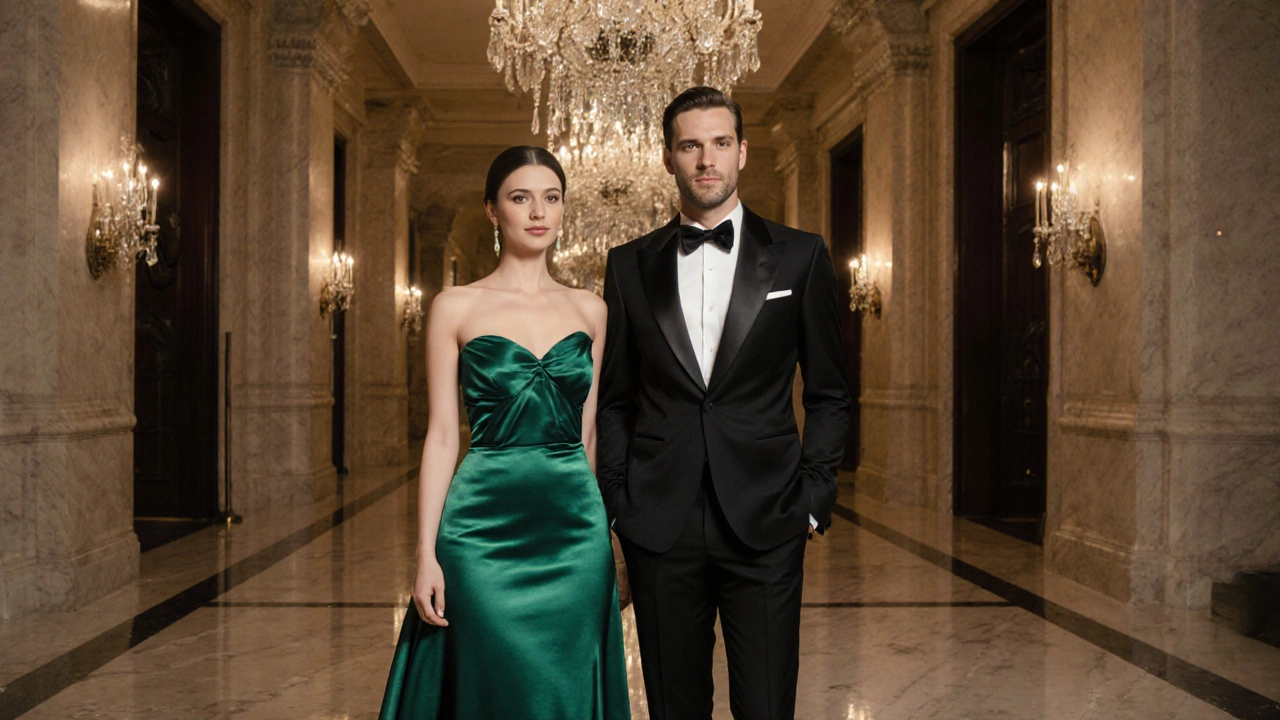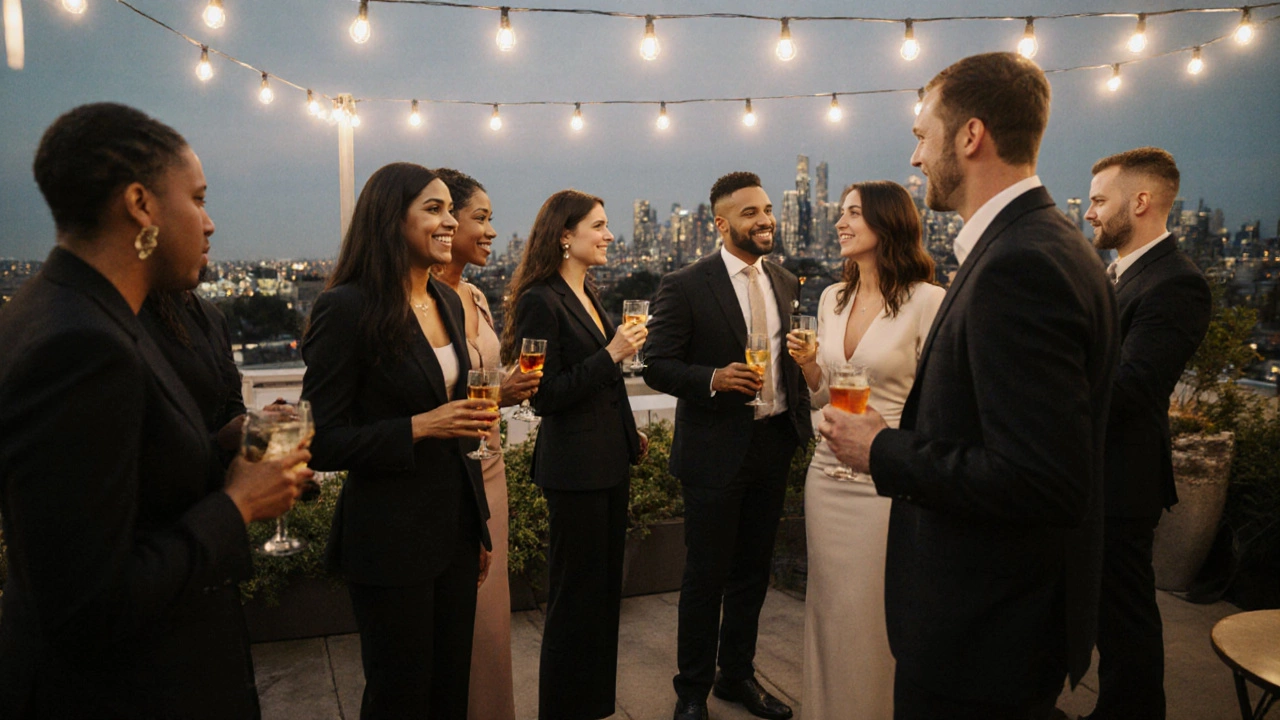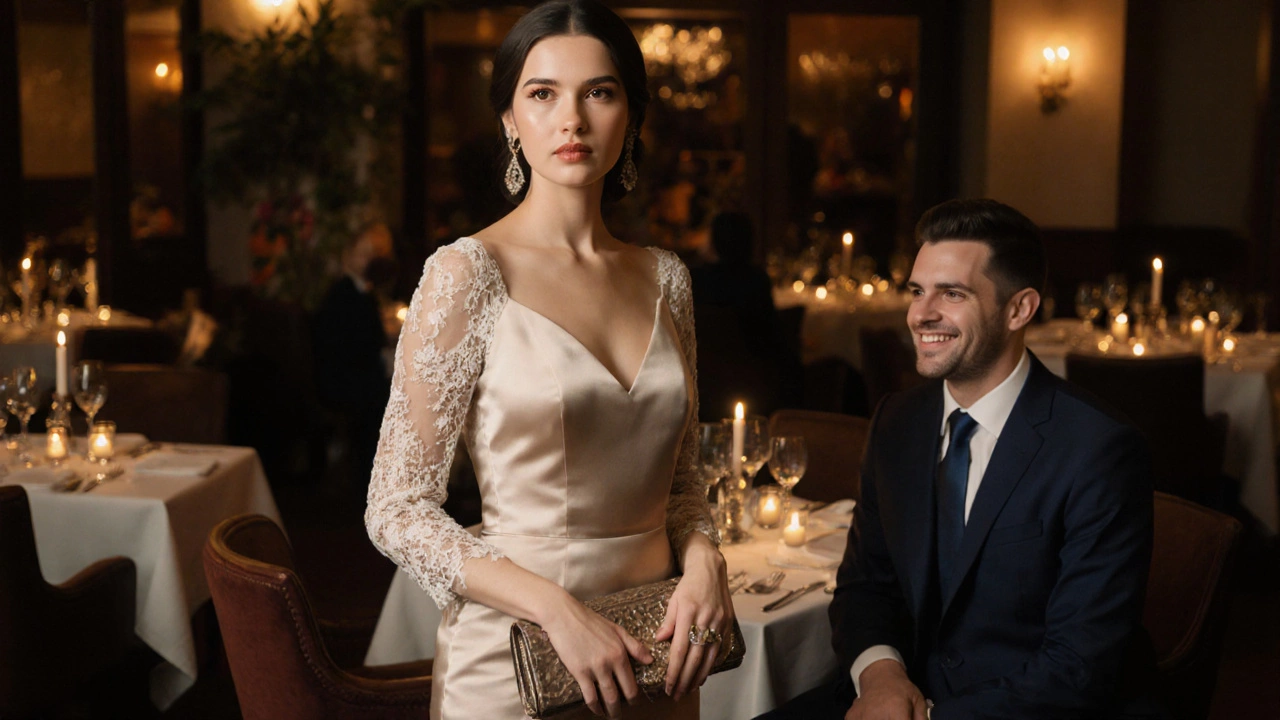Ever shown up to a fancy dinner or wedding and felt like you were wearing the wrong thing? You’re not alone. Most people get nervous about evening dress codes because they’re vague, outdated, or just confusing. Is it black tie? Is it cocktail? Do you really need a long gown? The truth is, evening dress codes aren’t about rules-they’re about matching the vibe of the event. And once you understand the basics, you’ll never second-guess your outfit again.
What Does Evening Dress Code Actually Mean?
Evening dress code refers to the expected level of formality for events that take place after 6 p.m. These aren’t casual hangouts or daytime weddings. Think galas, award nights, fine dining, opera openings, or upscale holiday parties. The goal is to look polished, elegant, and respectful of the occasion-not flashy, not sloppy.
There are three main levels of evening dress codes you’ll encounter: cocktail, formal (or black tie optional), and black tie. Each has clear expectations for men and women, and they’ve stayed mostly the same for decades. The confusion comes when invitations say things like "semi-formal" or "elegant attire." Those aren’t real codes-they’re just vague suggestions.
Cocktail Attire: The Most Common Evening Dress Code
More than 70% of evening events today fall under cocktail attire. It’s the sweet spot between casual and ultra-formal. You’ll see it at birthday dinners, engagement parties, corporate holiday events, and museum openings.
For women, cocktail means a dress that hits anywhere between the knee and mid-calf. It can be sleeveless, short-sleeved, or even long-sleeved. Fabrics like silk, lace, velvet, or chiffon work well. Avoid anything too casual-no denim, no t-shirts, no sneakers. And skip the floor-length gowns unless it’s a wedding. A little sparkle is fine, but don’t go full red carpet.
Men wear a suit and tie. No tuxedos needed. Dark navy, charcoal, or black suits are safe. A button-down shirt with a tie or a smart knit sweater under a blazer also works. Shoes should be polished leather-no loafers unless they’re dressy, and never white sneakers.
Formal (Black Tie Optional): When You Need a Little More Polish
When an invitation says "black tie optional," it means you have a choice: wear a tuxedo or go with your best formal outfit. Most people pick the latter, especially in the U.S. and Canada. But if you want to stand out in the best way, a tuxedo still makes a statement.
Women can wear a long gown, but it doesn’t have to be dramatic. A sleek, floor-length dress in a rich color like emerald, burgundy, or deep blue is perfect. You can also wear a sophisticated cocktail dress if it’s made from luxe materials and has elegant details-think structured shoulders, a high slit, or a dramatic back.
Men should wear a tuxedo if they’re going all in. That means a black jacket with satin lapels, matching trousers, a white dress shirt, a bow tie, and black patent leather shoes. If you skip the tuxedo, wear a dark suit with a tie (not a bow tie) and a pocket square. No colored socks. No open collars. This isn’t the time to experiment.

Black Tie: The Real Deal
Black tie means one thing: tuxedo for men, evening gown for women. This is the strictest level. You’ll see it at charity balls, formal weddings, or events hosted by elite clubs. If the invitation says "black tie only," don’t show up in a suit. You’ll stand out-and not in a good way.
Women’s evening gowns should be floor-length. They can be simple or ornate, but they must feel intentional. Think silk, satin, or sequins. Avoid anything that looks like a prom dress-too much tulle or glitter can look out of place. A bold color is fine, but classic black, navy, or gold are safest.
Men must wear a tuxedo. No exceptions. The jacket should have satin or grosgrain lapels. The shirt is a wing collar or a spread collar with French cuffs and cufflinks. A black bow tie is required-never a necktie. Patent leather oxfords and black socks complete the look. If you’re unsure, borrow a tuxedo or rent one. It’s cheaper than ruining your reputation.
What Not to Wear to an Evening Event
Evening dress codes aren’t about being boring-they’re about being appropriate. Here’s what never fits:
- Denim of any kind
- Flats or sandals (unless it’s a beach wedding with a clear dress code)
- Overly casual fabrics like cotton jersey or athletic mesh
- Too much jewelry or perfume
- White dresses (unless you’re the bride)
- Flip-flops, sneakers, or boots
Also, avoid anything too revealing. A plunging neckline is fine if it’s balanced with elegance. But if you’re showing more skin than a swimsuit, you’re probably overdoing it.
Season and Location Matter Too
Winter events? Add a wrap, a fur stole, or a tailored coat. Summer events? Lighter fabrics like chiffon or linen blends are okay-even for black tie, if the venue is outdoors and the invitation hints at it. Beach weddings with evening receptions? A knee-length dress or a linen suit might be acceptable.
Location changes expectations. In New York or London, black tie means black tie. In Miami or Los Angeles, people are more relaxed. Always check the venue’s vibe. If it’s a historic ballroom, lean formal. If it’s a rooftop bar with string lights, cocktail is fine.

When in Doubt, Ask
Don’t guess. Don’t assume. If the invitation doesn’t specify, call the host or check their website. Most people are happy to clarify. You can say something like, "I want to make sure I dress appropriately-could you help me understand the dress code?"
There’s no shame in asking. Everyone’s been there. And if you’re still unsure, go one level up. It’s better to be slightly overdressed than underdressed. A well-tailored dress or suit will always look better than something you had to rush to buy last minute.
What to Do If You’re on a Budget
You don’t need to spend hundreds to look great. Renting is a smart option. Companies like Rent the Runway or local boutiques offer evening dresses and tuxedos for under $100. Thrift stores and consignment shops often have high-quality formal wear from past seasons.
Look for versatile pieces. A black cocktail dress can work for cocktail, formal, and even some black tie events if styled right-with statement earrings, a clutch, and heels. A navy suit can be worn again for job interviews or business dinners.
Accessories make the difference. A silk scarf, a pair of elegant gloves, or a classic watch can elevate even a simple outfit.
Final Tip: Confidence Is the Best Accessory
At the end of the day, evening dress code is about respect-for the event, the host, and yourself. When you wear something that fits well, feels comfortable, and matches the occasion, you’ll walk in with your head up. That confidence matters more than any label.
Remember: the goal isn’t to look like a celebrity. It’s to look like the best version of you-polished, put-together, and ready to enjoy the night.
Is a cocktail dress the same as an evening dress?
A cocktail dress is a type of evening dress, but not all evening dresses are cocktail. Evening dress is the broad category that includes cocktail, formal, and black tie. A cocktail dress is shorter, usually knee-length, and meant for semi-formal events. Evening gowns are longer and reserved for black tie or formal occasions.
Can I wear a pantsuit to an evening event?
Yes, absolutely. A well-tailored pantsuit in silk, velvet, or satin is perfectly acceptable for cocktail and formal events. For black tie, it should be elegant and match the formality of a gown-think wide-leg trousers with a matching blazer and a delicate top. Many modern events now welcome pantsuits as a stylish, professional alternative.
Do I need to wear heels to an evening event?
Heels are traditional but not mandatory. If you can’t wear them, choose elegant flats with a pointed toe or low block heels. Avoid sandals, flip-flops, or athletic shoes. The key is to match the formality-your shoes should look intentional, not like you just stepped out of the gym.
What if the invitation says "elegant attire"?
"Elegant attire" usually means cocktail or formal. It’s a vague term used to avoid sounding too strict. When in doubt, go with a cocktail dress or a suit. Avoid casual fabrics and overly bright colors. Stick to classic silhouettes and rich textures.
Can men wear a dark suit instead of a tuxedo for black tie?
No. If the invitation says "black tie," a dark suit is not acceptable. A tuxedo has specific details: satin lapels, matching trousers, bow tie, and patent shoes. Wearing a suit will make you stand out for the wrong reason. Rent or borrow a tuxedo-it’s worth it for the occasion.
If you're preparing for an evening event this season, focus on fit, fabric, and confidence. Your outfit should feel like a second skin-not a costume. And if you're still unsure, remember: when in doubt, choose classic. Black, navy, and gold never fail.

